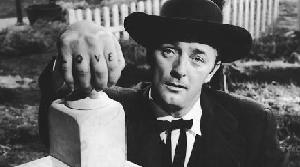
The Night of the Hunter (Charles Laughton, 1955)
Prolific actor Charles Laughton's only directorial work The Night of the Hunter begins in darkness, with the stars providing illumination. From the night sky appears the faces of children, and in the center, the calm and tender face of silent film superstar Lillian Gish telling biblical passages as an introduction to this parable-like tale of good and evil, and of innocence and sin. The film then cuts to an overview of a riverside community where playing children discover the body of a woman. Then it cuts to the film's most memorable character, Harry Powell (Robert Mitchum), driving down the road and conversing with his supposed God. We get the impression that the man is possibly deranged, and is either a self-righteous vindicator of Christianity, or merely a petty criminal who conveniently hides behind a mask of piety. Either way, we do know he's evil.
Powell finds himself imprisoned with a certain Ben Harper who killed two men and stole ten thousand dollars, and hiding them in a secret place his two children only knows where. After release, Powell travels to town and tries to squeeze from the children the location of the loot, even to the point of marrying their widowed mother, Willa (Shelley Winters), killing her, and then chasing the two children from their hometown to another riverside haven.
The Night of the Hunter is possibly one of the most terrifying films ever made. Laughton possesses a confident visual style that mirrors Orson Welles in his debut feature. Laughton's visual compositions are twisted, atmospheric and beautiful. Moreover, his distinctive artistic style is flawless. One just has to watch young John Harper (Billy Chapin) tell his little sister Pearl (Sally Jane Bruce) the story of an African king, when he is suddenly interrupted by an imposing shadow. He looks outside and discovers a man standing by the solitary oil-lit street lamp. That seamless mixture of flawless direction, impeccable photography, graceful acting, and delirious writing makes every scene in this film classic suspense filmmaking.
Then there's the famous river scene which begins with a feverish chase between Powell and the two kids. Amidst the calm starry sky, little Pearl sings an equally calming lullaby. Yet we are all aware of what happened and what may possibly happen, but Laughton has the gall to sequence this dreamy scene that might probably be confused as a scene out of a fairy tale, if not viewed in the film's concept. The result is something nightmarishly surreal, a thing of cinematic beauty. The whole river sequence is wondrous, and it makes one wish that Laughton directed more films, but alas, The Night of the Hunter failed at the box office and Laughton swore he'd never direct another film again. James Agee supposedly adapted the screenplay from a David Grubb novel, but Robert Mitchum says in his autobiography that Laughton actually disliked Agee's screenplay, and just paid the screenwriter, and completely rewrote everything uncredited.
The Night of the Hunter is arguably one of the best films that purely depict good and evil. It bravely features children who are targets of violent and traumatic harm, over money they'd probably never ever use. There's an abundance of biblical allusions in the film, and the last third of the film features what probably may be the most simplistic yet captivating battle between good and evil. No, it doesn't feature a host of demons hording the children, being protected by beautiful angels. It actually just involves Harry Powell guarding the estate of Rachel Cooper (Lillian Gish), a kindly old woman who adopts children, including the two Harper kids. They engage in a duet that might very well be as detailed as warring factions of good and evil. Powell's baritone and Cooper's grandmotherly voice marrying in an enchanting gospel song: Laughton's cinematic tactics is just so deliriously magical that the film might very well be declared as sinful.
No comments:
Post a Comment